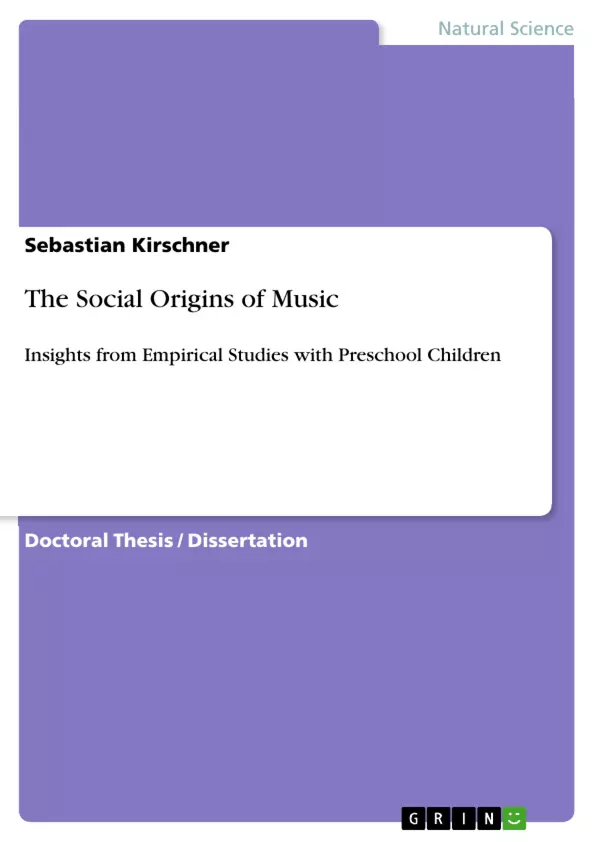Creating music is a distinctive behavior of our species: Humans of all cultures occasionally gather to make music together. However, there is discussion amongst scientists as to whether such behavior is a manifestation of innate psychological mechanisms that evolved as adaptations for music, or whether the diversity of musical behavior simply exemplifies the inventiveness of the human mind, in which case music should be considered a product of human culture. Scholars advocating the latter view divide further into those who believe that music is an evolutionary by-product, existing only for hedonistic reasons, and those who argue that certain musical behaviors emerged because they serve some culturally adaptive function. The goal of my dissertation was to add new empirical data to this debate by conducting behavioral studies with preschool children. In study 1 I tested the hypothesis that certain musical rituals emerged to foster social bonding, ultimately increasing prosocial in-group behavior. I found that joint music making enhances subsequent cooperative and helpful behavior among pairs of 4-year-old children. In study 2 I investigated the ontogeny of rhythmic entrainment, our ability to move in synchrony to a musical beat. I found that children spontaneously entrain their movements to an external drum beat at earlier ages and with higher accuracy if that beat is presented in a social context. Study 2 revealed large inter-individual differences in synchronization accuracy. To explain these, I hypothesized that rhythmic entrainment develops via social learning processes during early musical enculturation. I extended the original design of study 2 by adding a new condition (joint drumming without visual access to the partner’s movements) and a questionnaire about the participants’ musical experience. I collected comparable data from Germany and Brazil, assuming that children from those two countries gain qualitatively different experience with music. I found that in both samples the differences in synchronization accuracy correlated with those in musical experience. Furthermore, only German children tended to drum out of synchrony if the partner’s movements were hidden from view. I discuss my results in light of the above scenarios and come to the conclusion that music’s apparent adaptiveness to various instances of its use can be best explained by cumulative cultural evolution.
Inhaltsverzeichnis (Table of Contents)
- Zusammenfassung
- Summary
- Acknowledgements
Zielsetzung und Themenschwerpunkte (Objectives and Key Themes)
This dissertation investigates the evolutionary origins of music. The author seeks to contribute new empirical evidence to the ongoing debate about whether musical behavior is a product of innate psychological mechanisms or a result of human cultural flexibility and inventiveness.
- The role of music in fostering social bonding and prosocial behavior within groups
- The development of rhythmic entrainment, the ability to synchronize movements to a musical beat
- The impact of musical experiences on individual differences in rhythmic entrainment
- The influence of cultural factors on musical development and behavior
- The potential role of cumulative cultural evolution in explaining the apparent adaptiveness of musical behaviors
Zusammenfassung der Kapitel (Chapter Summaries)
The dissertation presents four studies exploring the role of music in social bonding and the development of rhythmic entrainment in young children. The first study examines the impact of joint music-making on prosocial behavior in pairs of four-year-old children. The second study investigates the ontogeny of rhythmic entrainment, exploring the influence of social context on children's ability to synchronize their movements to a drum beat. The third and fourth studies expand on the second, investigating the impact of musical experiences and cultural differences on individual differences in rhythmic entrainment. The author concludes that music's apparent adaptiveness to various situations is likely explained by cumulative cultural evolution, rather than innate psychological mechanisms specific to music.
Schlüsselwörter (Keywords)
The dissertation focuses on the evolutionary origins of music, exploring themes related to social bonding, rhythmic entrainment, musical enculturation, cumulative cultural evolution, and the influence of innate psychological mechanisms.
Frequently Asked Questions
What is the central debate regarding the evolutionary origins of music?
The main debate among scientists is whether musical behavior is a manifestation of innate psychological mechanisms evolved as adaptations, or if it is a product of human culture and inventiveness, potentially serving as an evolutionary by-product.
Does joint music-making influence social behavior in children?
Yes, the research found that joint music-making enhances subsequent cooperative and helpful behavior among pairs of 4-year-old children, supporting the hypothesis that musical rituals foster social bonding.
What is rhythmic entrainment and how does social context affect it?
Rhythmic entrainment is the ability to move in synchrony with a musical beat. The study revealed that children entrain their movements more accurately and at earlier ages when the beat is presented in a social context.
How do cultural differences between Germany and Brazil affect musical development?
The study found that synchronization accuracy correlates with musical experience in both countries. However, German children tended to drum out of synchrony more often than Brazilian children when their partner's movements were hidden from view.
What is the author's conclusion on the adaptiveness of music?
The author concludes that music's apparent adaptiveness is best explained by cumulative cultural evolution rather than innate psychological mechanisms specific to music.
- Quote paper
- Sebastian Kirschner (Author), 2011, The Social Origins of Music, Munich, GRIN Verlag, https://www.hausarbeiten.de/document/180239


